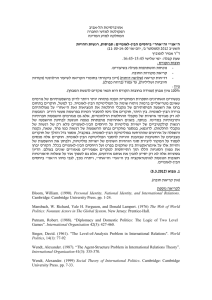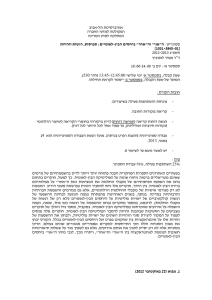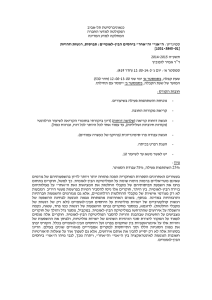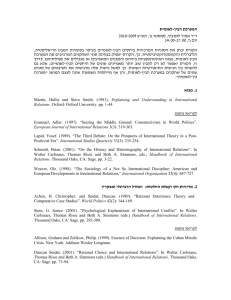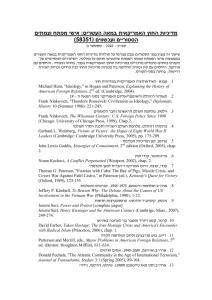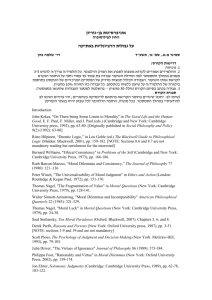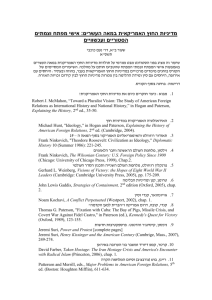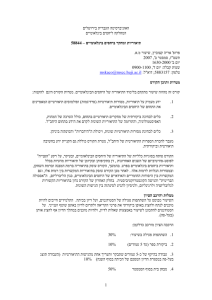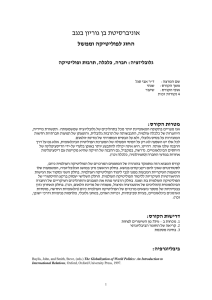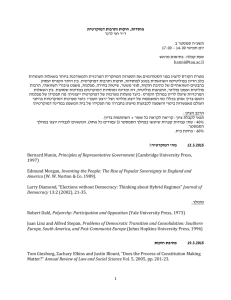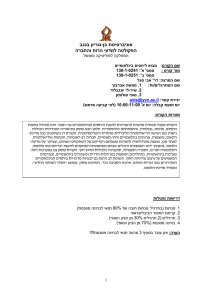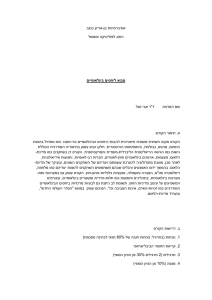לצפייה בסילבוס נא ללחוץ כאן
advertisement
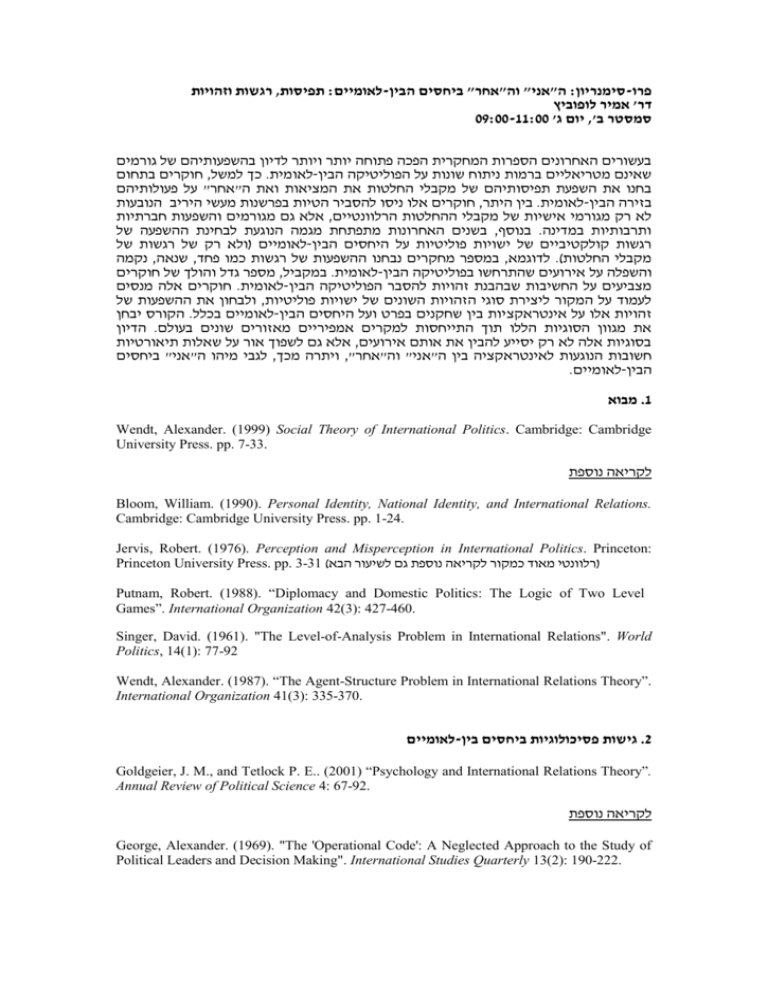
פרו-סימנריון :ה"אני" וה"אחר" ביחסים הבין-לאומיים :תפיסות ,רגשות וזהויות דר' אמיר לופוביץ סמסטר ב' ,יום ג' 09:00-11:00 בעשורים האחרונים הספרות המחקרית הפכה פתוחה יותר ויותר לדיון בהשפעותיהם של גורמים שאינם מטריאליים ברמות ניתוח שונות על הפוליטיקה הבין-לאומית .כך למשל ,חוקרים בתחום בחנו את השפעת תפיסותיהם של מקבלי החלטות את המציאות ואת ה"אחר" על פעולותיהם בזירה הבין-לאומית .בין היתר ,חוקרים אלו ניסו להסביר הטיות בפרשנות מעשי היריב הנובעות לא רק מגורמי אישיות של מקבלי ההחלטות הרלוונטיים ,אלא גם מגורמים והשפעות חברתיות ותרבותיות במדינה .בנוסף ,בשנים האחרונות מתפתחת מגמה הנוגעת לבחינת ההשפעה של רגשות קולקטיביים של ישויות פוליטיות על היחסים הבין-לאומיים (ולא רק של רגשות של מקבלי החלטות) .לדוגמא ,במספר מחקרים נבחנו ההשפעות של רגשות כמו פחד ,שנאה ,נקמה והשפלה על אירועים שהתרחשו בפוליטיקה הבין-לאומית .במקביל ,מספר גדל והולך של חוקרים מצביעים על החשיבות שבהבנת זהויות להסבר הפוליטיקה הבין-לאומית .חוקרים אלה מנסים לעמוד על המקור ליצירת סוגי הזהויות השונים של ישויות פוליטיות ,ולבחון את ההשפעות של זהויות אלו על אינטראקציות בין שחקנים בפרט ועל היחסים הבין-לאומיים בכלל .הקורס יבחן את מגוון הסוגיות הללו תוך התייחסות למקרים אמפיריים מאזורים שונים בעולם .הדיון בסוגיות אלה לא רק יסייע להבין את אותם אירועים ,אלא גם לשפוך אור על שאלות תיאורטיות חשובות הנוגעות לאינטראקציה בין ה"אני" וה"אחר" ,ויתרה מכך ,לגבי מיהו ה"אני" ביחסים הבין-לאומיים. .1מבוא Wendt, Alexander. (1999) Social Theory of International Politics. Cambridge: Cambridge University Press. pp. 7-33. לקריאה נוספת Bloom, William. (1990). Personal Identity, National Identity, and International Relations. Cambridge: Cambridge University Press. pp. 1-24. Jervis, Robert. (1976). Perception and Misperception in International Politics. Princeton: (רלוונטי מאוד כמקור לקריאה נוספת גם לשיעור הבא) Princeton University Press. pp. 3-31 Putnam, Robert. (1988). “Diplomacy and Domestic Politics: The Logic of Two Level Games”. International Organization 42(3): 427-460. Singer, David. (1961). "The Level-of-Analysis Problem in International Relations". World Politics, 14(1): 77-92 Wendt, Alexander. (1987). “The Agent-Structure Problem in International Relations Theory”. International Organization 41(3): 335-370. .2גישות פסיכולוגיות ביחסים בין-לאומיים Goldgeier, J. M., and Tetlock P. E.. (2001) “Psychology and International Relations Theory”. Annual Review of Political Science 4: 67-92. לקריאה נוספת George, Alexander. (1969). "The 'Operational Code': A Neglected Approach to the Study of Political Leaders and Decision Making". International Studies Quarterly 13(2): 190-222. Herrmann, Richard and Fischerkeller, Michael. (1995) "Beyond the Enemy Image and Spiral Model: Cognitive-Strategic Research after the Cold War". International Organization 49 (3): 415-450. Hymans, E. C. Jacques. (2006). The psychology of Nuclear Proliferation: ,sntitod ,ttitned yn, ot siin ot ino. Cambridge: Cambridge University Press. pp. 16-46. Jervis, Robert. (1976). Perception and Misperception in International Politics. Princeton: Princeton University Press. Levy, S. Jack. (1992). “Prospect Theory and International Relations: Theoretical Applications and Analytical Problems”. Political Psychology 13 (2): 283-310. Stein, Gross. Janice. (2002). “Psychological Explanations of International Conflict”. In Carlsnaes, Walter, Risse, Thomas and Simmons, A. Beth. (eds.). Handbook of International Relations. Sage. pp. 292-308. לאומיים- השפעה של תרבות על היחסים הבין.3 Desch, Michael. 1998. “Culture Clash: Assessing the Importance of Ideas in Security Studies”. International Security 23(1): 141-70. לקריאה נוספת Cohen, Raymond. (1996). Negotiating Across Cultures: International Communication in an Interdependent World. Washington: United States Institute of Peace Press. pp. 9-44. Farrell, Theo. (1998). “Culture and Military Power”. Review of International Studies 24(3): 407-416. Glenn, John. (2009). “Realism versus Strategic Culture: Competition and Collaboration?” International Studies Review 11(3): 523-51. Huntington, Samuel. (1996). The Clash of Civilizations and the Remaking of World Order. New York: Simon & Shuster. pp. 19-55. Johnston, Iain Alastair. (1995). “Thinking about Strategic Culture”. International Security 19(4): 32-64. Krause, R. Keith. (1999). "Cross Cultural Dimensions of Multilateral Non-Proliferation and Arms Control Dialogues: An Overview”. In Keith R. Krause (ed.) Culture and Security. London: Frank Cass. pp. 1-22. Van Evera, Stephen. (1984). "The Cult of the Offensive and the Origins of the First World War”. International Security 9(1): 58-107. Weldes, Jutta, Laffe Mark, Gusterson Hugh, and Duvall Raymond. (1999). “Indroduction: Constructing Insecurity.” In Jutta Weldes, Mark Laffey, Hugh Gusterson and Raymond Duvall (eds.). Cultures of Insecurity: States, Communities and the Production of Danger. Minneapolis: University of Minnesota Press. pp. 1-33. בין רגשות של יחידים לרגשות קולקטיביים:לאומיים- רגשות ביחסים בין.4 Crawford, Neta. (2000). “The Passion of World Politics: Propositions on Emotion and Emotional Relationships”. International Security 24(4): 116-156. לקריאה נוספת .חברתי של החברה היהודית בישראל- ניתוח פסיכולוגי. לחיות עם הסכסוך.)2007( . דניאל,טל-בר .277-301 ' עמ. כרמל:ירושלים Auerbach, Yehudit. (1986) “Turning-Point Decisions: A Cognitive-Dissonance Analysis of Conflict Reduction in Israeli-West German Relations”. Political Psychology 7(3): 533-50. Holsti, Ole R. and Alexander L. George. (1975). "The Effects of Stress on the Performance of Foreign Policy-Makers". In Cornelius P. Cotter (ed.) Political Science Annual, Vol. 6: 255319. Hymans, E. C. Jacques. (2006). The psychology of Nuclear Proliferation: ,sntitod ,ttitned inoyn, ot siin ot. Cambridge: Cambridge University Press. pp. 16-46. (מופיע כפריט לקריאה .)2 'נוספת גם בשיעור מס Lebow, Ned. (2005). "Reason, Emotion and Cooperation". International Politics. 42(3): 283313. McDermott, Rose. (2004). “The Feeling of Rationality: The Meaning of Neuroscientific Advances for Political Science”. Perspectives on Politics 2(4): 691-706. Mercer, Jonathan. (forthcoming). “Deterrence and Emotional Beliefs”. International Organization. Ross, A. G. Andrew. (2006). “Coming in From the Cold:” Constructivism and the Emotions”. European Journal of International Relations 12(2): 197-222. רגשות ברמת המדינה.5 Löwenheim, Oded and Heimann, Gadi. (2008/9). “Revenge in International Politics”. Security Studies 17(4): 1-40. לקריאה נוספת Fattah, Khaled and Fierke, K, M. (2009). “A Clash of Emotions: The Politics of Humiliation and Political Violence in the Middle East”. European Journal of International Relations. 15(1): 67-93 Kaufman, Stuart. (2001) Modern Hatreds: The Symbolic Politics of Ethnic War. Ithaca: Cornell University Press. pp. 15-84. Saurette, Paul. (2006) You Dissin me? Humiliation and Post 9/11 Global Politics. Review of International Studies 32(3): 495-522 Small, A. Deborah, Lerner S. Jennifer and Fischhoff, Baruch. (2006). "Emotion Priming and Attributions for Terrorism: Americans' Reactions in a National Field Experiment ". Political Psychology 27(2). pp. 289-298. זיכרון קולקטיבי.6 : ירושלים.חברתי של החברה היהודית בישראל- ניתוח פסיכולוגי. לחיות עם הסכסוך.)2007( . דניאל,טל .112-137 ' עמ.כרמל לקריאה נוספת Booth, James William. (2006). Communities of memory: on witness, identity, and justice. Ithaca: Cornell University Press pp. 1-38. Löwenheim, Nava. (2009). “A Haunted Past: Requesting Forgiveness for Wrongdoing in International Relations”. Review of International Studies 35(3): 531-555 Olick, Jeffrey K.; Robbins, Joyce. (1998). “Social memory studies: from "collective memory" to the historical sociology of mnemonic practices”. Annual Review of Sociology 24(1): 105140. לאומיים- זהות ביחסים בין.7 Wendt, Alexander. (1999) Social Theory of International Politics. Cambridge: Cambridge University Press. pp. 215-233. לקריאה נוספת Bially-Mattern, Janice. (2005) Ordering International Order. Identity, Crisis, and Representational Force. New York: Routledge. pp. 2-46. Bially-Mattern, Janice. (2001). "The Power Politics of Identity". European Journal of International Relations 7(3): 349-397 Berger, Peter, and Thomas Luckmann. (1966) The Social Construction of Reality: A Treatise on the Sociology of Knowledge. New York: Anchor Books. pp. 163-183. Bloom, William. (1990). Personal Identity, National Identity, and International Relations. Cambridge: Cambridge University Press. pp. 25-53. Fearon, James and Laitin, David. (2000). “Violence and the Social Construction of Ethnic Identity”. International Organization 54(4): 845-877 Hopf, Ted. (2002) Social Construction of International Politics. Identities and Foreign Policies, Moscow, 1955 & 1999. Ithaca: Cornell University Press. pp. 1-38. Mercer, Jonathan (1995). “Anarchy and Identity”. International Organization 49(2): 229-52 Neumann, B. Iver. (1996). “Self and Other in International Relations,” European Journal of International Relations. 2(2): 139-74 Wendt, Alexander. (1999) Social Theory of International Politics. Cambridge: Cambridge University Press. pp. 193-214, 234-45. זהות של תפקיד ודילמת הביטחון האונתולוגית.8 Mitzen, Jennifer. (2006) Ontological Security in World Politics: State Identity and the Security Dilemma. European Journal of International Relations 12(3): 341-70. פוליטיקה.” ההרתעה הישראלית במלחמת לבנון השנייה- זהות וביטחוןd “שיח.)2007( . אמיר,לופוביץ .73-95 :17 לקריאה נוספת Northrup, A. Terrell. (1989) “The Dynamic of Identity in Personal and Social Conflict” in Intractable Conflicts and Their Transformation, edited by Louis Kriesberg, Terrell A. Northrup, Stuart J. Thorson, pp. 55-82. New York: Syracuse University Press. Steele, Brent. (2005). “Ontological Security and the Power of Self-Identity: British Neutrality and the American Civil War”. Review of International Studies 31(3): 519-40 Sucharov, Mira M. (2005) The International Self. Psychoanalysis and the Search for IsraeliPalestinian Peace. New York, Albany: State University of New York Press. pp. 17-68. Waxman, Dov. (2006) The Pursuit of Peace and the Crisis of Israeli Identity. Defining/Defending the Nation. New York: Palgrave. Zaretsky, Eli. (2002). “Trauma and Dereification: September 11 and the Problem of Ontological Security”. Constellations 9(1): 98-105. . זהות קולקטיבית וקהילות ביטחון.9 Adler, Emanuel. and Barnett, Michael. (1998). A Framework for the Study of Security Communities. In Emanuel Adler and Michael Barnett (eds.) Security Communities. New York: Cambridge University Press. pp. 29-66. Pouliot, Vincent (2007). Pacification Without Collective Identification: Russia and the Transatlantic Security Community in the Post-Cold War Era. Journal of Peace Research 44(5): 605-622. לקריאה נוספת Adler, Emanuel. (2008). The Spread of Security Communities: Communities of Practice, Self-Restraint, and NATO’s Post–Cold War Transformation. European Journal of International Relations. 14(2):195-230. Adler, Emanuel and Barnett, Michael. (eds.) (1998). Security Communities. New York: Cambridge University Press. : ובמיוחד הפרק הבא,שאר הפרקים בספר זה Wæver, Ole. (1998). Insecurity, Security, and Asecurity in the West European Non-war Security. In Adler, Emanuel. and Barnett, Michael. (eds.) Security Communities. New York: Cambridge University Press. pp. 69-118. פרזנטציות.10-11 ?לאומיים- אז מיהו האני ומיהו האחר ביחסים הבין: סיכום וכיווני מחקר עתידיים.12 Sterling-Folker, Jennifer. (2009). “Neoclassical realism and identity: peril despite profit across the Taiwan Strait”. In Steve E. Lobell, Norrin M. Ripsman and Jeffrey W. Taliaferro (eds.) Neoclassical Realism, the State, and Foreign Policy. pp. 99-138. Wendt, Alexander. (1999) Social Theory of International Politics. Cambridge: Cambridge University Press. pp. 193-224 .)7 (חלק מעמודים אלה חופפים את חומר הקריאה לשיעור לקריאה נוספת Bloom, William. (1990) Personal Identity, National Identity, and International Relations. Cambridge: Cambridge University Press. pp. 128-63. Buzan, Barry. Waever, Ole and de Wilde Jaap. (1998). Security: A New Framework for Analysis. Boulder: Lynne Rienner. pp. 1-48. Williams, C. Michael (2003). Words, Images, Enemies: Securitization and International Politics. International Studies Quarterly 47(4): 511-31. Onuf, Nicholas. (1995). "Levels". European Journal of International Relations 1(1): 35-58 Wendt, Alexander. "Levels of Analysis vs. Agents and Structures: Part III," Review of International Studies 18(2): 181-185.
